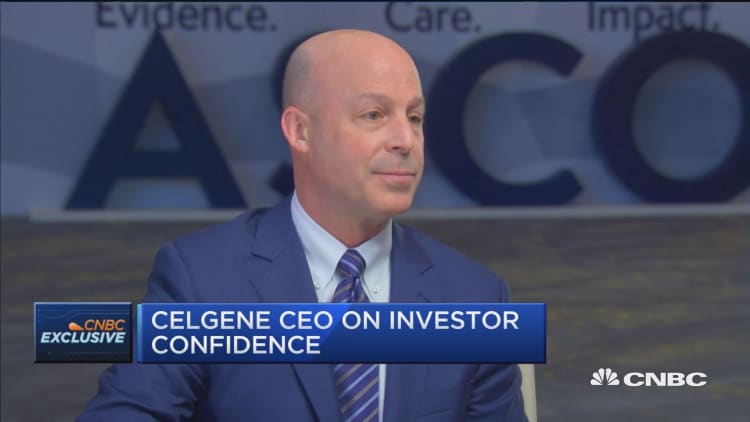
Celgene Chairman and CEO Mark Alles told CNBC on Monday the biotech company does not need to be the market leader to thrive with new cancer therapies to replace chemotherapy.
"The first thing that investors and the medical community ... [are] realizing is that this class of medicine of CAR-T therapy — whether its lymphoma, leukemia or myeloma — will replace existing chemotherapy," Alles said in a "Squawk Box" interview.
CAR-T cell therapy takes a patient's own immune cells, called T cells — genetically manipulating them to attack specific proteins on cancer and infusing them back into the patient.
"There's a lot of room for a lot of product to come in and really do what these drugs are doing — high response rates, durable remissions and actually get away from chronic treatment," Alles said.
Celgene is working on an experimental new gene therapy designed to treat people with relapsed or refractory aggressive B-cell non-Hodgkin lymphoma.
The company on Sunday presented updated results on its treatment at the annual meeting of the American Society of Clinical Oncology. The data showed that at six months, 49 percent of patients remained in remission, with 46 percent maintained a complete response.
Novartis and Gilead Sciences already received the first two approvals of CAR-T for other types of cancer. For one-time treatments, they cost $475,000 and $373,000, respectively.
Alles on Monday said the market is "years away" from being saturated with CAR-T therapies, adding that Celgene will continue to execute on its "rich" pipeline of drugs.
"There's nothing like pipeline success to reverse sentiment," he said.
Celgene loses patent protection by 2022 for Revlimid, its top-selling multiple myeloma drug that brought in about 60 percent of fiscal third-quarter revenue of nearly $3.3 billion.
In January, Celgene agreed to buy rest of Juno Therapeutics it didn't already own for about $9 billion in cash to gain access to Juno's pipeline of CAR-T cancer drugs. The deal closed in March.


